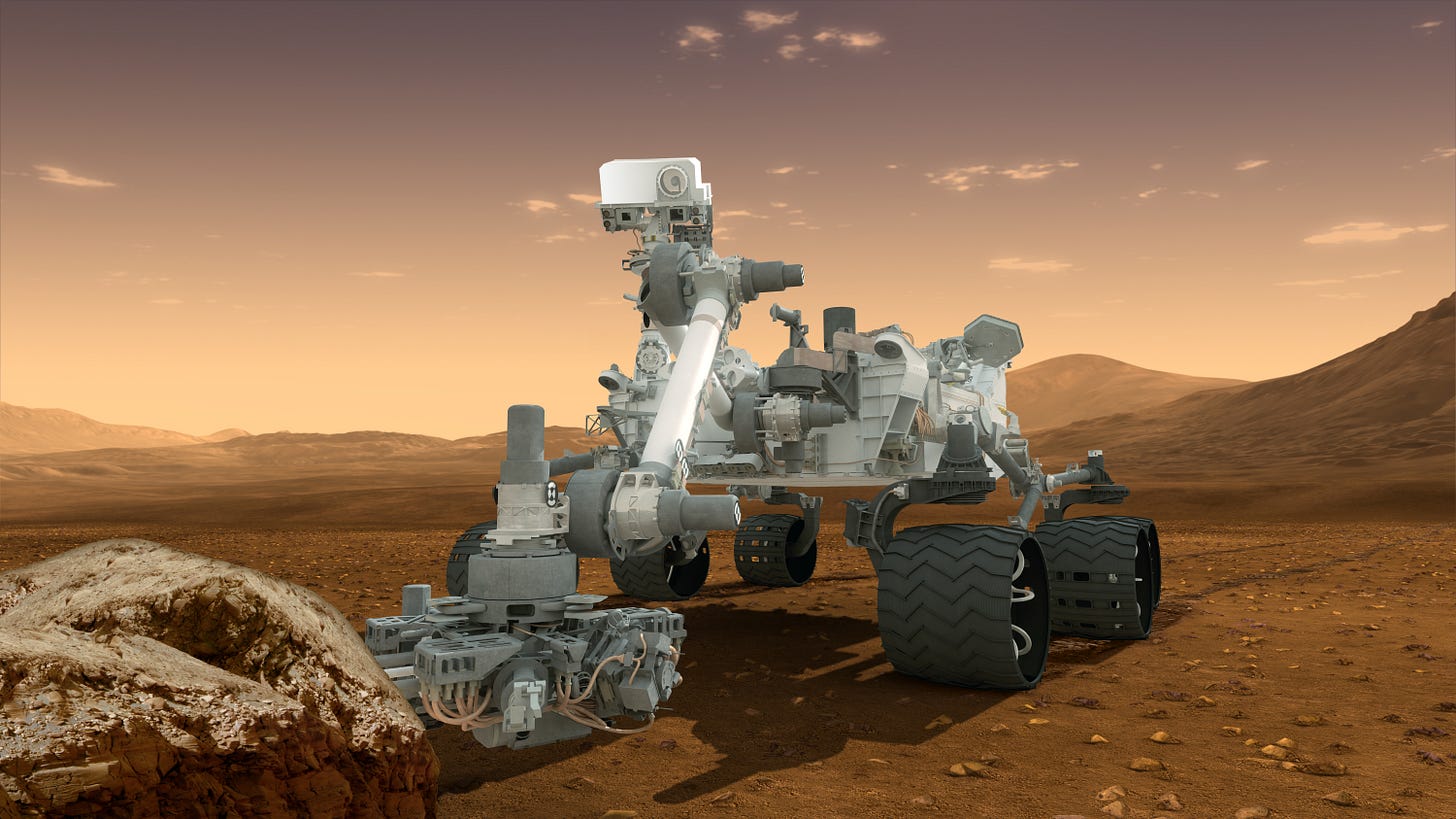Mind and Iron, Special Election Edition: What the second Donald Trump presidency will mean for tech and the future
Crypto coins, moon rocks and silicon chips
Hi and welcome back to another bubbly episode of Mind and Iron. I'm Steven Zeitchik, veteran of The Washington Post and Los Angeles Times and chief caller at this newsy phone bank.
Every Thursday we give you all the tech and future-world news you could want, through a common-sense humanist lens. We're totally independent and plan to stay that way..
It's been an intense week, no matter which side of the aisle you're on. Our job here at M&I is not to weigh in with political preferences. It is, however, to assess how human-centric our future will look based on new developments and trends. And Donald Trump is the ultimate new (/old) development and trend.
I was thinking about it during the post-election hangover haze Wednesday: A child born in 2004 will have both entered middle school and graduated college when Trump was president, a long time by any measure. But what happens when said kid gets deeper into adulthood — what kind of world will they be occupying?
For that, you'll need to know where Trump stands on crypto, space exploration, computing development and AI. Not always easy given his many and at times inconsistent public statements. But the clues are out there.
However you feel about him, Donald Trump will leave his stamp on this decade and, through his policies, likely the 2030’s too. So let's see what the imprint looks like. We’ll be diving into the topic in this issue and also serve as your one-stop shop for all things Trump and tech/AI in the months ahead.
First, the future-world quote of the week:
“We would expect significant AI initiatives from the Beltway that would be a benefit for Microsoft, Amazon, Google, and other tech players...Under a Trump Administration we would expect major AI initiatives within the U.S. government including the Department of Defense that would also be a major tailwind for AI players like Palantir."
— Wedbush Securities analyst Daniel Ives, using wonkspeak to say "the guardrails are off and the pedal is floored."
Let's get to the messy business of building the future.
IronSupplement
Everything you do — and don’t — need to know in future-world this week
Trump on the moon; Trump in a Large Language Model; Trump in a crypto mine.
1. LET'S START IN SPACE.
A very good place to start. The potential downside here is more limited; pretty much all space innovation (outside controversial military stuff) is worthy innovation.
On the surface, Donald Trump is all about space exploration. He extols Elon Musk and can't stop talking about that rocket catch. In 2017 he signed a directive that laid the groundwork for the Artemis lunar mission (“It marks a first step in returning American astronauts to the Moon for the first time since 1972," he said at the signing.) And there's that infamous (and slightly misunderstood) Space Force.
For someone who measures success in infrastructure projects and the grandeur thereof, space would seem like the perfect pursuit. Trump came of age in a time when nothing outcooled space exploration — he was 23 when Neil Armstrong took his giant leap — and clearly has continued that thinking today.
But there's space...and there's space. For all that enthusiasm, Trump has suggested that these low-earth orbit and moon dalliances — exactly the kind of stuff both within reach and in active planning — is not something he wants to bother with. Barely a year after that 2017 lunar directive he seemed to lose interest. "For all of the money we are spending, NASA should NOT be talking about going to the Moon — We did that 50 years ago," he said in 2019. (Also: “I will free NASA from the restriction of serving primarily as a logistics agency for low-earth orbit activity." Never mind that the low-earth stuff is often what enables farther-flung missions.)
Then there's this pattern. The 20th-century was filled with presidents setting ambitious space agendas. Reagan and Bush I both increased NASA's budget by double digits. Clinton established the International Space Station.
But that went by the boards this century. Bush II raised the NASA budget by only a very small amount. Obama actually decreased the budget. And Trump in his first term made cuts to the ISS and an asteroid-exploration program. Faced with massive deficits, the government has increasingly left space exploration to private outfits like Musk's SpaceX — or other countries.
And that may be the biggest obstacle to ambitious space exploration in Trump II — paying for the damn thing. Because while your money is no good in space, ya kind of need a lot of it to get there. It literally costs $2 million dollars per week just to bring an astronaut water on the ISS.
Trump's general spending plans could raise the national debt to an eye-popping $7.5 trillion. And as he's promised to cut that debt, NASA and its $25 billion annual budget may be a juicy target. For those who want science and exploration to continue, Trump's fascination with space is heartening. For those who know the promises he can't pay for, it's sobering.
The emergence of private companies like SpaceX and Blue Origin has lifted some of the pressure off NASA ; it would be disingenuous to claim the agency needs the same resources as it did when no such private enterprise existed. Still, the goals of these entities are different: SpaceX is largely trying to commercialize space while NASA is trying to understand it, and if we're going to build a more enlightened future, we kind of need the understanding part.
In an odd twist, Trump's Artemis mission, which he authorized back in 2017, is scheduled to reach its crucial stage of a manned lunar landing in 2026 — exactly in the middle of his term. As JFK could tell you, it's rare for something as far-reaching as a lunar landing to be conceived and overseen by the same president (I guess that's where taking a term off helps). But Trump will be in just that position. So while he may have plenty of budgetary reasons to reverse-thrust, he may have an even bigger reason to keep the momentum going: His legacy depends on it.
2. THERE WILL BE PLENTY MORE TO SAY ABOUT TRUMP AND AI AS THE TECH HURTLES FORWARD WHILE HE'S IN OFFICE. BUT A FEW THINGS ARE WORTH SAYING NOW.
The debate in AI circles for years has been between EA, or effective altruism, and e/acc, or effective accelerationism. The former spells long-term thinking about the good of humankind (and the related AI Safety concerns that come with it). The latter spells throw-off-the-shackles-and-see-what-it-can-do, never mind the consequences. Sam Altman is the embodiment of the latter. (Elon Musk, in theory, talks about the former, but that may just be because he doesn't like Sam Altman.)
Now Trump is coming in with a long track record of trying to loosen regulations and a new incentive to appease Silicon Valley. Already plenty of outlets are assuming he'll void President Biden's AI order from last fall — he's basically said as much.
The Biden order, while it has its heart in its right place, is kind of toothless. As we told you about at the time of its signing, it asks a lot of right of the questions but doesn't really have the ability to do anything about it; at most it asks companies to subscribe to its precepts. Its most toothsome provisions has companies reporting training models and test results on safety; another tasks the Commerce Department to guide companies on potential bias issues. Anyway, doesn’t matter now. Let's just assume that's all gone.
In short, if you are on the side of going full-speed-ahead on releasing AI products without really testing or consider the consequences, this was a good week for you. If AI Safety and proceeding with thoughtfulness and caution are your watchwords, as they are here at M&I headquarters, this was a pretty bad week. Federal guardrails seem like a fantasy. It will be statewide stuff (not exactly encouraging given where Gavin Newsom has been on AI Safety) and negotiated settlements between labor guilds and their employers that stand in the way of the full acceleration. The idea that it would be good for the dark-arted Palantir should be enough to give us pause right there.
There are some small caveats though, and they may prove significant. One is that voters may actually want some guardrails — more than 60 percent of both Republicans and Democrats are worried about AI models trained on publicly available data (in fact the number is slightly higher for Republicans). As much as Republicans oppose regulation, they're as a group more likely to be skeptical of the latest slick tech-minded creation (see under: electric vehicles). Which could oddly slow down a headlong rush on AI.
Parts of Silicon Valley have managed to align themselves with Trump and his populism. But the idea of billionaires pushing models that are addictive — and, let's face it, sophisticated and expensive — may not be something that plays to the throwback, strip-it-down base that values fossil fuels and de-fluoridated water. Tech companies like to sell people on a flashy new product that will change their lives. Trump's base can be wary of the pitch.
Also, let's not forget that Musk, whether for reasons of ideology or bitterness, is against full-on accelerationism and thinks it's a threat to humanity. And Musk, at least until they fall out, is in Trump's ear.
Finally, no president likes unemployment — especially presidents who ran on the economy. And AI advances will come with a strong component of job displacement.
I don't ultimately think Trump will care too much about injecting deliberateness into the AI development process. But then, there was little reason to think any president would or could throw up the roadblocks. And there just may be a few reasons that stop Trump from slamming on the gas.
3. A SLEW OF FUTURE-RELATED INDUSTRIES WILL BE ADJUDICATED BY DONALD TRUMP. TWO OF THEM INVOLVE MASSIVE COMPOUNDS WHERE COMPUTING GOES NONSTOP.
The first of these is the crypto mining industry. Crypto-mining giants like Riot Blockchain build huge data centers in vast spaces from Texas to upstate New York (or just take over old industrial spaces) and run their energy-gobbling operations. (Mining of course isn’t from the ground; it's the running of ginormous data servers to process the empty calculations that lead to the creation of unique crypto tokens).
Needless to say, crypto comes with a lot of downside. You don't need to have read too many past newsletter issues to know our skepticism. Forget the volatility that can wipe out fortunes. Ignore the get-rich-quick ethos that makes it ripe for scams. Put out of mind the anonymity that can lead to bad actors bad-acting. The simple environmental cost of crypto is enough to make us curse the name of Satoshi Nakamato, whoever he is. According to M&I pal and tech-environmental expert Alex de Vries, bitcoin mining now consumes as much energy as the Netherlands and generates as much C02 as Morocco.
We should be thinking long and hard about embracing a technology that takes such a big toll and gives us, economically and socially, so little. Alas, Trump as president is unlikely to do that.
He made big promises during the campaign that he would embrace crypto, talked up vague new projects of his own and said that "crypto is one of those things we have to do." He pledged at a crypto convention in Nashville to make the U.S. “the bitcoin superpower of the world,” just before collecting as much as $840,000 per person at a fundraiser (presumably not in Bitcoin).
And maybe most crucially he has vowed to remove SEC chair Gary Gensler, one of the few government regulators doing anything to try to stop the runaway crypto train. Not for nothing did Bitcoin surge as news came of Trump's successes Tuesday night.
Any hope that crypto will see even a few speed bumps is a pipe dream; the cautionary tale that FTX and Sam Bankman-Fried offered less than two years ago may as well be 200 years ago. An outlier and a bug, not an insider and a feature, say crypto's many defenders.
It would take a legit crash or a scam of massive proportions for crypto regulation to come to the fore again. If it does, Trump might jump on the wagon. But don't bet your bitcoin.
The other massive-hangar initiative yields a brighter picture. It is the so-called CHIPS and Science Act, which when signed into law by President Biden in 2022 provided a total of some $52 billion for computer-chip production and research in the U.S. as well as billions more in tax credits. Intel will receive more than $8 billion in incentives. Samsung is investing in U.S. chip production and landing a $6 billion payout. All of this means that the stuff that powers AI — and AI demands lots of the stuff — is more likely to be made in the U.S.
It remains a question whether, scientifically speaking, it really matters which company or country is producing the chips. But the Act does ensure that U.S. consumers are more likely to have access to them — a statement one at least can’t make as easily if China dominates. Maybe more important, a whole separate portion of the bill earmarks public money for scientific research — some $174 billion of it. It’s impossible to know how all of this will be spent, but the overall tilt is for the kind of research that potentially brings lots of benefits to humankind, including in realms like biotech, spaceflight and quantum computing.
The CHIPS Act became a bit of a political football when House Speaker Mike Johnson a few weeks ago said Congress would likely repeal it under Trump, then walked back the comments shortly after.
Trump himself told Joe Rogan it was a "bad" deal — he didn't like the idea of so many billions going to foreign companies.
But these are foreign companies that would give Americans jobs. And plenty of the money goes to U.S. companies and tech interests (including tech interests that supported Trump). So most experts believe Trump would at most seek to tweak but not overturn the CHIPS Act. Which would be good news. Spending cuts may be on the docket. But science hasn't completely lost its place on it — yet.
The Mind and Iron Totally Scientific Apocalypse Score
Every week we bring you the TSAS — the TOTALLY SCIENTIFIC APOCALYPSE SCORE (tm). It’s a barometer of the biggest future-world news of the week, from a sink-to-our-doom -5 or -6 to a life-is-great +5 or +6 the other way. Last year ended with a score of -21.5 — gulp. Can 2024 do better? The year started off strong but the summer wasn’t great. This week is...an uncomfortable mix.
TRUMP COULD INJECT SOME ENERGY INTO SPACE EXPLORATION : +3.5
AI REGULATION IS A GONER UNDER TRUMP: -4.5
CRYPTO WILL RUN FREE UNDER TRUMP, BUT SO WILL LOTS OF CHIPS AND SOME SCIENCE: +1.5








